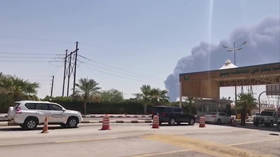Did Saudi Arabia allow drone attacks on its oil facilities?

The billions of dollars Saudi Arabia spends on defense failed to prevent the strikes on its most critical refineries, sending oil prices soaring. This raises unsettling questions about who has the most to gain from the disruption.
The Saturday attacks caused the steepest crude spike in 30 years. Around 5.7 million barrels of daily crude output have been wiped out, which is more than half of the kingdom’s daily exports and five percent of the world’s oil supply.
Washington and Riyadh have blamed Iran for the attacks on the facilities. US officials say the attacks might have involved a combination of drones and cruise missiles. However, no evidence has been provided beyond satellite photos, which analysts say are insufficient to prove where the attacks came from, which weapons were used, and who fired them.
“Maybe that was the esoteric intent behind Washington and Riyadh – which retain technological and defense capabilities for preventing drone attacks – actually allowing the attacks against Aramco to take place,” Pye Ian, an American economic analyst and private equity executive, told RT.
Also on rt.com Oil prices skyrocket 20% after attacks on Saudi plants disrupt global supply“Namely, targeting Iran for the blame and eventual retribution so as to block the building Eastern-and-Southern momentum away from petrodollar hegemony, of which Iran, Russia, China, Venezuela, and even Turkey, play key, integrative roles,” Ian said.
Saudi Arabia, which ranks third in terms of defense spending, has “a great deal of explaining to do” regarding how it could fail to defend its “most critical” oil facility from drone attacks, former US ambassador to Oman Gary Grappo was cited as saying by CNBC.
However, a Russian military expert told RT there may be a simpler explanation as to why the Saudis failed to intercept the drones, despite having the latest military equipment.
The Saudis purchase the most expensive defence systems in the world but lack the expertise to use them, according to military analyst Viktor Litovkin. He also explained that the Saudi military had simply underestimated the Houthi rebels.
Also on rt.com Oil at $100 per barrel? Attack on Saudi refineries could shake oil market furtherIt could take weeks or even months to reconstruct the damaged oil facilities, yet Aramco has promised that it will be able to keep customers supplied for several weeks by drawing on its global oil storage network.
According to Pye Ian, there’s plenty of oil from other producers to make up for the expected Saudi shortage, but the question of whether they’ll be provisioned is more of a political consideration, rather than an economic or technical one, “As it has been for decades.”
The oil price is a key geopolitical tool, Ian told RT. “Oil’s price spikes – whether resulting from military or political conflicts – aren’t necessarily due to the laws of supply and demand, despite claims otherwise by industry sources, bank analysts, politicians or the financial press. Just as oil’s price drops aren’t either.”
Also on rt.com Massive heart attack for oil market? Drone raid on Saudi facilities may push oil to $100He added that “those controlling the pricing and trading standard of oil were and are capable of doing much, including throwing currency wars, embargoes or trade wars, or stoking riots in the streets, of emerging market nations and oil producers who do not abide by Atlanticist collective political aims.”
The recent attacks against Saudi Arabia’s production capacity will “thus be utilized by said banking system and tethered governments for sweeping aims, and not coincidentally as global monetary paradigm shifts are underway toward cryptocurrency and blockchain protocols while jubilees of one means or another are violently sought against trillions in unserviceable public and private debts in the US and UK.”
Ian noted: “Credibly disrupting – let alone wholly replacing – the nearly half century-old oil pricing, benchmark-trading, and reserve-recycling orthodoxy would, as such, ‘flip tables’, geopolitically speaking.”
For more stories on economy & finance visit RT's business section














